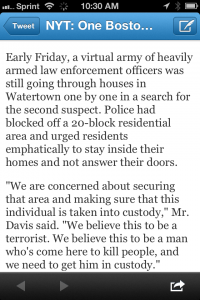 I was trying trying to keep up with the events taking place in Watertown at breakfast Friday morning, when I read this sentence on Twitter:
I was trying trying to keep up with the events taking place in Watertown at breakfast Friday morning, when I read this sentence on Twitter:
Early Friday, a virtual army of heavily armed law enforcement officers was still going through houses in Watertown one by one in a search for the second suspect.
I know the article meant that there were so many officers they virtually made up an army. However, in a world of technological advancements, including drones, GPS tracking through cell phones, and “virtual” games, shopping, and other inventions, my mind immediately envisioned an actual “virtual army.”
At first, I was amazed that we are now so technically evolved the FBI was able to send a virtual army to the Watertown neighborhood to ferret out the escaped Marathon bomber.
Of course, I realized within a few seconds that this wasn’t possible, but it was a quick lesson in the evolution of language. The primary meaning of virtual for me has changed. I think “virtual reality” first, then remember the traditional meaning: “in essence.”
vir·tu·al
adjective \ˈvər-chə-wəl, -chəl; ˈvərch-wəl\
a : occurring or existing primarily online <a virtual library><virtual shopping>
b : of, relating to, or existing within a virtual reality <avirtual world> <a virtual tour>
